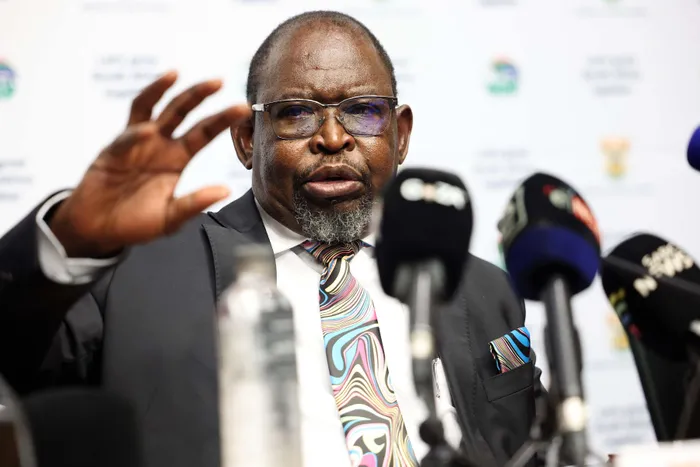
The markets will be watching Finance Minister Enoch Godongwana closely when he delivers the Medium-Term Budget Policy Statement on November 12.
Image: Jairus Mmutle | GCIS
South Africans battling high food and fuel costs could get some relief, if the Reserve Bank’s calculations are right.
The markets will be watching Finance Minister Enoch Godongwana closely when he delivers the Medium-Term Budget Policy Statement on November 12.
Wednesday’s budget is likely to bring the cost of living into sharp focus, with economists saying he could well back a plan to lower the country’s inflation target range.
South African Reserve Bank Governor, SARB Governor Lesetja Kganyago, has been pushing to lower the inflation target from the current 3%–6% range to a flat 3%.
Kganyago argues that a lower target would support “sustainable economic growth and cheaper borrowing costs”.
This could eventually make borrowing and living costs cheaper.
Investec treasury economist Tertia Jacobs said the change would give the policy more credibility.
“What we have seen is that South Africa’s target range is actually at the top end of most emerging markets,” she said.
Jacobs added that “what is very important is that the minister of finance backs it up with a lower inflation target, say from 2 to 4 percent”.
Jacobs said the Reserve Bank had already shifted its focus to the bottom end of the current 3 to 6 percent range.
“If the government can embrace it because it means broader buy-in, that will give impetus and support to the Reserve Bank,” she said.
National Treasury and the central bank had been investigating the impact of lowering the target.
A lower inflation target won’t bring instant price cuts, but it could ease pressure on households by:
Nedbank Corporate and Investment Banking said stronger tax collections and high gold and platinum prices had boosted revenue this year.
It forecast a R60 billion tax revenue overshoot in the 2025/26 financial year, giving Treasury slightly more space to manage spending.
The national budget was finally passed in May – after two failed attempts – leaving government battling to fill a R75 billion revenue hole.
It had planned to raise value-added tax (VAT) from 15% to 15.5% this year and again to 16% next year but could not get all members of the Government of National Unity (GNU) to agree.
A later proposal for a smaller 0.5 percentage point VAT increase was also dropped in April after several court challenges.
Still, economists warn that any relief must be handled carefully.
Bishop said that “reining in the borrowing, especially on areas that are not seen as necessarily growth-promoting,” was key.
Jacobs echoed that sentiment, saying fiscal consolidation – keeping spending in check – remained “absolutely critical".
Investec chief economist Annabel Bishop said there had been an improvement in South Africa’s economic growth.
“The perhaps slightly unpredictable agricultural component has been a huge driver of South Africa's economic growth,” she said.
What was also key, said Bishop, “is that we have found the delay in the implementation of US tariffs as being one of the key factors why we've actually revised our GDP growth forecast up a little bit this year”.
Bishop added that “we are hopeful that economic growth will be quicker than expected, than the forecasts”.
This, Bishop said, should help relieve government’s burden of high debt, which is partially due to it helping rescue state-owned enterprises.
“If you don't have sustainable finances, if you keep on borrowing, it actually runs away with you,” she said.
Bishop added that a more credible policy path could also improve South Africa’s standing with credit rating agencies over time.
“We do hope that fiscal slippage now starts to come to an end with the government of national unity,” said Bishop.
Osa Mazwai, singer-songwriter and investment strategist, said long-term growth remained the missing piece.
“Growth is ultimately what investors are buying into,” he said.
“We’ve had a period of very sluggish growth permanently over the past 15 years or so, averaging around 1%. That is just simply not good enough,” said Mazwai.
Mazwai said growth above 2% was needed to make a real dent in unemployment and help South Africans feel the benefits of economic reform.
IOL Business